|
|
|
Sort Order |
|
|
|
Items / Page
|
|
|
|
|
|
|
| Srl | Item |
| 1 |
ID:
084031
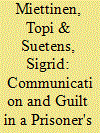

|
|
|
|
|
| Publication |
2008.
|
| Summary/Abstract |
In this article, the authors measure experienced guilt in a prisoner's-dilemma experiment with preplay communication. The authors find that feelings of guilt only arise in the case of unilateral defection and that they are stronger when players have mutually agreed to cooperate. The authors also find that fining unilateral defection reduces feelings of guilt.
|
|
|
|
|
|
|
|
|
|
|
|
|
|
|
|
| 2 |
ID:
084030
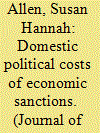

|
|
|
|
|
| Publication |
2008.
|
| Summary/Abstract |
While a great deal of attention has been to paid to whether or not economic sanctions work, less energy has been devoted to exploring the causal mechanisms that lead to the success or failure of sanctions policies. Often, it is assumed that the population is one important source of political costs for targeted leaders, but this assumption has not been tested. Are sanctions related to an increase in antigovernment activity? How does the domestic political system of the targeted state affect the likelihood of this antigovernment behavior? The findings presented here suggest that sanctions may increase antigovernment activity, but that increase is mitigated by the domestic political structures of the target state. In autocratic targets, political violence is less likely to occur when sanctions are in place. For sanctions against autocratic states to be costly, it appears that the political costs needed to alter behavior must be generated internationally rather than domestically.
|
|
|
|
|
|
|
|
|
|
|
|
|
|
|
|
| 3 |
ID:
084032
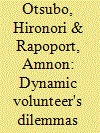

|
|
|
|
|
| Publication |
2008.
|
| Summary/Abstract |
Volunteer's dilemmas that evolve over time are presented and modeled as noncooperative n-person games in extensive form with symmetric players, discrete time, finite horizon, and complete information. Volunteering is costly, thereby giving rise to free riding. Reflecting on the observation that in many naturally occurring social dilemmas it is beneficial to volunteer earlier than later, the model assumes that the payoff to the volunteer and the (higher) payoff to each of the nonvolunteers decrease monotonically over time. The authors construct symmetric and asymmetric subgame perfect equilibria to the game. An experimental study shows that financially motivated subjects who are rewarded contingent on their performance volunteer more readily when the cost of volunteering is relatively low; that they largely fail to coordinate on any of the asymmetric equilibria in which only a single subject volunteers immediately; that they volunteer, on average, earlier than predicted; and that they vary considerably from one another in their inclination to free ride.
|
|
|
|
|
|
|
|
|
|
|
|
|
|
|
|
| 4 |
ID:
084029


|
|
|
|
|
| Publication |
2008.
|
| Summary/Abstract |
What explains variation in domestic political instability in polities imposed by foreign powers? We formulate a framework grounded in four sources of political instability in imposed polities: (1) the initial conditions under which a polity is imposed, (2) policy choices made by the imposer, (3) the prevailing domestic conditions within states hosting the imposed polity, and (4) the international environment within which the host state is embedded. Employing a sample of ninety-four imposed polities during the period 1816-1994 to test expectations from the framework, we find, in part, that ethnoreligious heterogeneity coupled with democratic institutions, preimposition military defeat, colonial experience, dissimilarity of neighboring political institutions, hostility from neighboring states, and the presence of the imposing state each stimulate political instability. The analysis suggests a bleak prognosis for domestic peace in postinvasion Afghanistan and Iraq as the causal factors that militate against domestic stability are manifold and likely reinforcing.
|
|
|
|
|
|
|
|
|
|
|
|
|
|
|
|
| 5 |
ID:
084026


|
|
|
|
|
| Publication |
2008.
|
| Summary/Abstract |
Natural disasters occur in a political space. Although events beyond our control may trigger a disaster, the level of government preparedness and response greatly determines the extent of suffering incurred by the affected population. The authors use a political-economy model of disaster prevention, supported by case studies and preliminary empirics, to explain why some governments prepare well for disasters and others do not. The authors show how the presence of international aid distorts this choice and increases the chance that governments will underinvest. Policy suggestions that may alleviate this problem are discussed.
|
|
|
|
|
|
|
|
|
|
|
|
|
|
|
|
| 6 |
ID:
084028
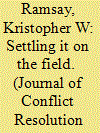

|
|
|
|
|
| Publication |
2008.
|
| Summary/Abstract |
Using a sample of battlefield data from twentieth-century wars, the author of this article tests a number of previously untested hypotheses linking battle events and the decision to end violent conflict. The author explores how factors like the distribution of power, battlefield casualties, and information that flows from the battlefield influence war termination. The analysis speaks to the validity of competing rational choice theories of war termination.
|
|
|
|
|
|
|
|
|
|
|
|
|
|
|
|
| 7 |
ID:
084027
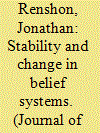

|
|
|
|
|
| Publication |
2008.
|
| Summary/Abstract |
Cognitive frameworks and belief systems are the primary lenses through which presidents view the world. Two important questions are whether these beliefs ever change significantly, and if so, what causes these changes? This article develops empirical data on the strategic and operational beliefs of President George W. Bush (GWB) as a means of examining the theoretical basis for how and why core beliefs change. The author analyzes the foreign policy operational code of President Bush in four separate phases of his political career: the immediate prepresidential phase; his nine months in office prior to September 11, 2001; the six months immediately following the 9/11 terrorist attacks; and his last year in office as a second-term president. The results of this article allow us to address several recurring questions that concern the Bush administration and presidents' belief systems and decision making. They challenge traditional interpretations of the Bush presidency and provide some insights into the causal mechanisms that underlie belief change.
|
|
|
|
|
|
|
|
|
|
|
|
|
|
|
|
| 8 |
ID:
084025


|
|
|
|
|
| Publication |
2008.
|
| Summary/Abstract |
Most of the burgeoning theoretical and empirical literature on the role of leaders in comparative politics and international relations is built on the assumption that leaders choose policies to stay in office. However, leaders can lose office in a variety of ways. Leaders can lose office as a result of ill health; they can lose office in a regular manner; or they can be removed in an irregular manner such as by a coup. How a leader loses office, moreover, significantly affects the leader's subsequent fate. A broader perspective on not just the probability, but also the manner of losing office-and its associated consequences-thus suggests an additional mechanism to explain the behavior of leaders. If policy significantly affects not just whether, but also how, leaders lose office, leaders might design policy to minimize the anticipated negative consequences of losing office. Once we unpack the manner in which leaders lose office, for example, we see that the postulated logic of diversionary war only holds for a subgroup of leaders: those who fear an irregular removal from office.
|
|
|
|
|
|
|
|
|
|
|
|
|
|
|
|
|
|
|
|
|